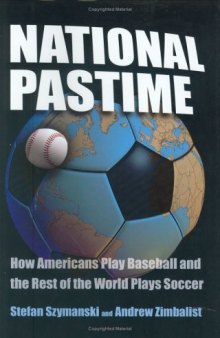 جزییات کتاب
جزییات کتاب
National cultures are built around national pastimes. How we play helps define who we think we are. This is the story of two great sports—America’s game, and the world’s game. Baseball is America’s game, a national obsession that remains largely North American, even though it bills its championship as the World Series. Soccer is the world’s game, a sport over which no nation can claim ownership. Its World Cup is truly international and the ultimate yardstick of national self-esteem. National Pastime is the first in-depth cross-cultural comparison of these sporting passions and the mega-businesses they have become. In National Pastime, Stefan Szymanski and Andrew Zimbalist examine how organizational structures have made Major League Baseball a profitable business (notwithstanding common claims made by the owners) while soccer leagues around the world struggle to break even. They weave a rich variety of stories, anecdotes, and photos into their account of how these games became businesses, and how these businesses have adapted to the demands of fans. The authors show how early administrators of baseball and soccer leagues were influenced by the parallel developments of each sport and, in particular, how the concept of the league was invented by American baseball and transplanted first to English soccer, and then to the rest of the world. In their final chapter, the authors discuss the lessons that baseball and soccer can learn from each other today. In some cases, they argue for radical restructuring, and they offer a blueprint for reform. Szymanski and Zimbalist show how a careful understanding of one sport can provide useful insights into the specific challenges facing the other. This engaging and readable book will entertain history buffs and sports fans alike, while providing participants and analysts with important insights. Even the most knowledgeable fans will learn a great deal about why their beloved sport developed along certain lines, and how it could be improved. Some fans may even discover that what they’ve been missing out on across the Atlantic—as the authors note, seeing the world through someone else’s eyes can be instructive and rewarding… not to mention fun.



 دانلود کتاب
دانلود کتاب

 جزییات کتاب
جزییات کتاب





 این کتاب رو مطالعه کردید؟ نظر شما چیست؟
این کتاب رو مطالعه کردید؟ نظر شما چیست؟
